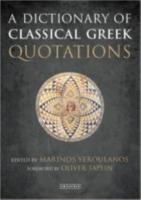
I.B. Tauris (2016) h/b 897pp £35 (ISBN 978184534929)
Here is a bargain buy if ever there was one. This is the first ever book of classical Greek quotations, unless one counts the ancient paroemiographers, who compiled books of proverbs and sayings. It lists, alphabetically by author, c. 7,500 sayings in Greek (some by Roman authors, e.g. Caesar’s kai su, teknon ‘You too, son!’), followed by their translation in English, and ends with modern quotations on Greece and Greeks. Most important of all, there is a keyword index to the English translation of the various topics dealt with, running to over 150 pages in very small type. So if you know no Greek but fancy an ancient Greek quotation for any purpose on any subject, this is the book for you. From the over 20,000 entries, take your pick among anything from aliens to apes, beards to bribes, fate to frogs, life to death, war to peace and so on.
The most quoted authors are Euripides, romping home with 557 quotations, and longo sed proximi intervallo Plato (415), Sophocles (402), Homer (401), the Bible (373) and Menander (347). The most popular topics with at least a column in the index (c. 75 entries) are birds, children, cities, death (2), evil, fortune, friends (2), gods (5), good and evil, laws, life (2), love (2), man and man-and-woman (3), minds, nature, nothing, old age, pleasures, self, souls, speech, states, time, truth, virtue, war, wealth, wisdom, women and words. But it is made clear that one topic relates to another, so that e.g. while there are only ten entries under ‘sex’ and ‘intercourse’ and eleven under ‘homosexuality’, there are long lists of related topics under love, passion, desire and so on.
Inevitably, in a book of this size and scope, there are inaccuracies. A quote from the comic poet Anaxandrides (penês ôn tên gunaika khrêmata labôn ekhei despoinan, ou gunaik’ eti) is supposed to mean ‘A poor man taking a rich wife has a mistress not a wife’. What it actually means is ‘a poor man getting rich turns his wife into his boss, not his wife any more’. A savage attack in the Iliad turns into a recipe: ‘A ravenous boar … stewed the ground with the tall fruit trees’. Pope’s ‘Welcome the coming, speed the parting guest’ derives rather from Odyssey 15.74 than the quoted 72-3. Some quotations are not self-explanatory and need to be glossed, e.g. ‘Both love of money and overweening pride’ in the accusative (Aristotle), explained by the footnote that this was the situation in Athens that Solon had to deal with.
Some people will never be satisfied with any collection of quotations unless they compiled it. In this reviewer’s opinion, Y.’s Dictionary is a stupendous achievement, which will bring great pleasure and much interest to what one hopes will be its many readers. Further, I.B. Tauris is to be warmly congratulated on its design, accessibility and price. It should be a fixture in every home that values the past.
Peter Jones
